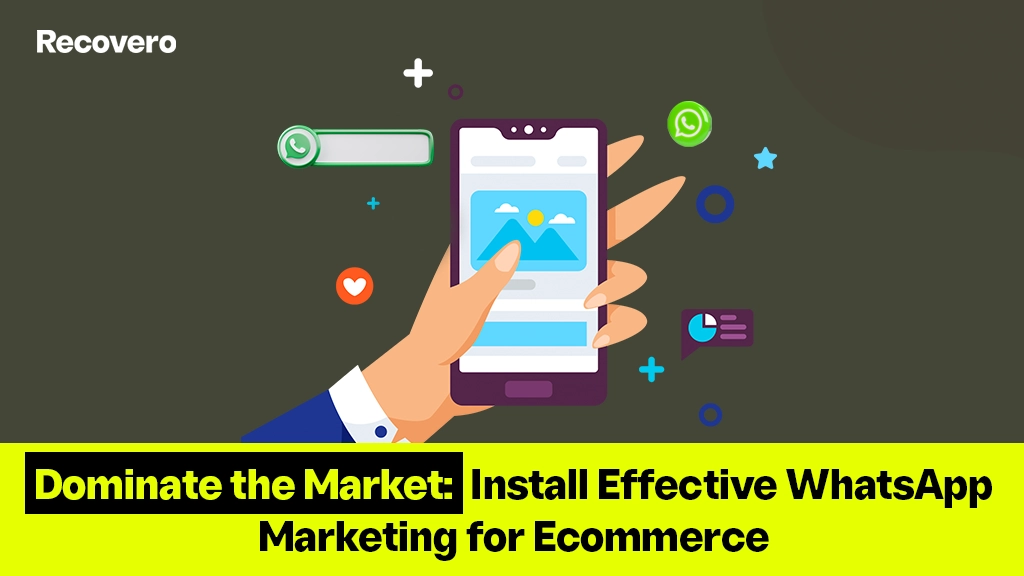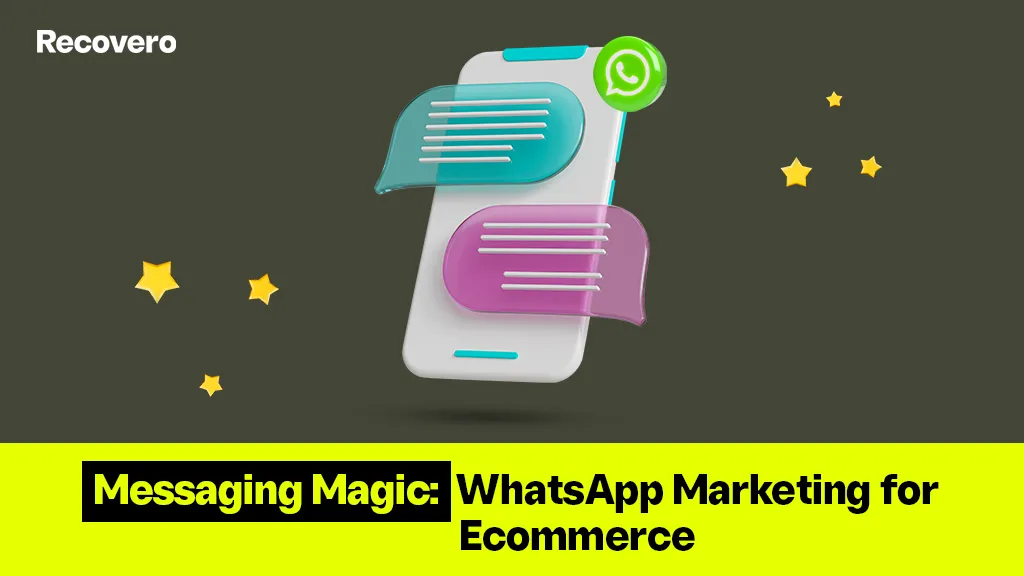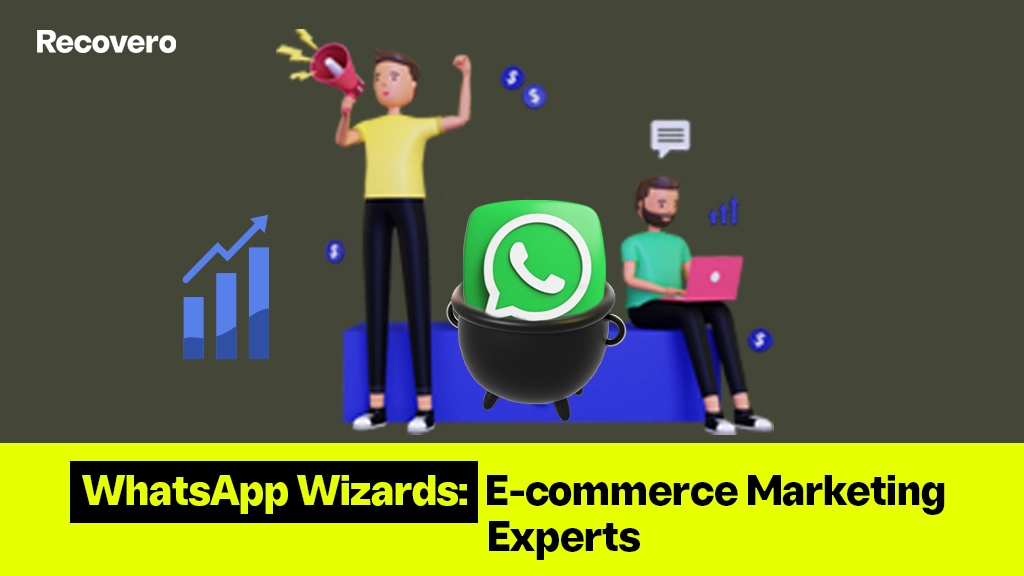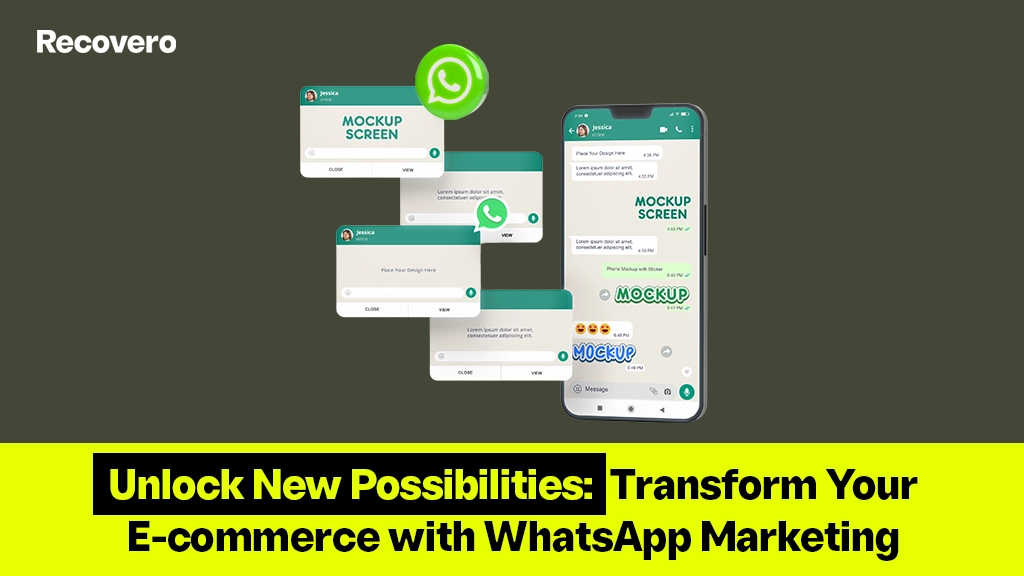In today’s digital landscape, businesses are seeking innovative ways to stay ahead of the competition. WhatsApp Marketing has emerged as a powerful tool that can help e-commerce businesses reach and engage target audiences like never before. By leveraging the immense popularity of WhatsApp, businesses can establish:
- direct communication channels,
- provide personalized customer experiences,
- and drive sales and conversions.
In this article, we will explore various strategies to install effective WhatsApp Marketing for e-commerce businesses, enabling them to dominate the market.
The Power of WhatsApp Marketing:-
WhatsApp has over 2 billion active users worldwide. It has become a dominant force in the messaging app ecosystem.
- Its widespread popularity and high engagement rates make it a goldmine for businesses, looking to connect with their target audience.
- With WhatsApp Marketing, businesses can engage with customers, build brand loyalty and drive conversions through personalized and timely communication.
- E-commerce businesses can enjoy incorporating WhatsApp into their marketing strategy.
- With the rise of mobile shopping, WhatsApp provides a seamless platform for businesses to connect with customers on their preferred devices.
- By leveraging WhatsApp, E-commerce businesses can enhance customer support, improve engagement, and increase sales by delivering personalized
- product recommendations,
- exclusive offers, and
- seamless sale experiences.
Understanding WhatsApp for Business
- Overview of WhatsApp Business:
WhatsApp Business is a specialized version of the app designed for businesses. It offers a range of features that enable businesses to
- establish a professional presence,
- engage with customers, and
- provide a seamless customer experience.
WhatsApp Business allows businesses to create a dedicated business profile and access messaging statistics. And leverage automation tools to streamline communication.
- Features and Benefits of WhatsApp Business:
WhatsApp Business offers a variety of features tailored to meet the needs of e-commerce businesses. Some of the key features include the ability to create a business profile with important information. Like business descriptions, contact details, and website links. Additionally, businesses can use labels to organize and categorize conversations. Ensuring efficient customer management. The availability of automated messages, quick replies, and chatbots enables businesses. To handle customer queries and provide support round the clock.
Setting Up Your WhatsApp Business Account:-
- Creating a WhatsApp Business Profile:
To get started with WhatsApp Marketing, E-commerce businesses need to create a WhatsApp Business profile. This involves downloading and installing WhatsApp Business app from the respective app store. And registering with a valid phone number. Once the account is set up, businesses can customize their profile by adding relevant details. Such as business name, logo, and contact information.
- Customizing Your Business Profile:
A well-crafted and appealing business profile helps establish credibility and trust among customers. E-commerce businesses should ensure that their profile reflects their brand identity. And includes important information such as business hours, location, and website links. By customizing the business profile, businesses can make a positive first impression. And entice customers to engage with their brand.
- Managing Contacts and Broadcast Lists:
Effective contact management is essential for successful WhatsApp Marketing campaigns. E-commerce businesses should maintain an organized contact list. Segmenting customers based on their preferences and buying history. This allows businesses to send targeted messages and offers. Ensuring higher engagement and conversion rates. Additionally, businesses can create broadcast lists. To send messages to many contacts, improving efficiency and reach.
Building a WhatsApp Subscriber List:-
- Strategies to Grow Your WhatsApp Subscriber List:
Building a strong subscriber list is crucial for a successful WhatsApp Marketing campaign. E-commerce businesses can use various strategies to encourage customers. To subscribe to their WhatsApp updates. This includes promoting the benefits of subscribing, and offering exclusive content or discounts. And integrating subscription options across different customer touchpoints.
- Encouraging Customers to Opt-in for WhatsApp Updates:
To maximize subscriber opt-ins, E-commerce businesses should communicate the value proposition of receiving WhatsApp updates. Highlighting the benefits such as early access to promotions, personalized recommendations, and support. It can incentivize customers to opt in. Businesses can use their website, social media channels, and email marketing. To promote WhatsApp subscriptions and drive opt-ins.
- Leveraging Existing Customer Channels for Subscriptions:
E-commerce businesses can leverage their existing customer communication channels to promote WhatsApp subscriptions. This can include adding WhatsApp subscription links or QR codes. To email newsletters, order confirmations, and customer support interactions. By providing easy access to WhatsApp subscriptions. Businesses can expand their subscriber base and foster stronger customer relationships.
Crafting Compelling WhatsApp Messages:-
- Understanding the Different Message Types:
WhatsApp offers different message types that businesses can use to communicate with their customers. Text messages are the most common and versatile type. Allowing businesses to send personalized messages, order updates, or customer service responses. Additionally, businesses can leverage multimedia messages. By sending images, videos, or audio files to enhance engagement and showcase products.
- Writing Engaging and Personalized Messages:
To capture customers’ attention and encourage interaction, E-commerce businesses should craft engaging and personalized messages. This involves understanding the target audience and addressing their pain points. And tailoring messages to resonate with their needs. By using a conversational tone, relevant product information, and personalized greetings. Businesses can create a positive and engaging customer experience.
- Tips for Effective Message Formatting and Length:
To ensure the readability and impact of WhatsApp messages, businesses should consider the formatting and length of their content. Short sentences and paragraphs make messages easy to read. While bullet points and line breaks improve visual appeal. Additionally, businesses should aim for concise yet informative messages. Conveying the essential information without overwhelming the customer.
Automating WhatsApp Campaigns:-
- Introduction to WhatsApp Business API:
For larger e-commerce businesses with high message volumes, the WhatsApp Business API provides advanced automation capabilities. The API allows businesses to integrate WhatsApp with their existing CRM systems. Enabling automated messaging, chatbots, and advanced analytics. This streamlines communication enhances efficiency, and enables businesses. To scale their WhatsApp Marketing efforts.
- Integrating Automation Tools for Bulk Messaging:
To streamline bulk messaging and optimize campaign reach, E-commerce businesses can integrate automation tools with the WhatsApp Business API. These tools enable businesses to create and schedule bulk messages. Target specific customer segments, and automate responses based on predefined triggers. By automating routine tasks, businesses can focus on high-value interactions. And provide timely responses to customer queries.
- Setting Up Autoresponders and Chatbots:
Autoresponders and chatbots play a crucial role in delivering prompts. And personalized customer support on WhatsApp. E-commerce businesses can set up autoresponders to provide instant replies. To common queries or to acknowledge customer messages outside business hours. Additionally, deploying chatbots powered by artificial intelligence allows businesses. To handle basic customer inquiries, recommend products, and provide 24/7 support.
Implementing Personalized Customer Support:-
- Using WhatsApp for Real-Time Customer Service:
WhatsApp offers e-commerce businesses an opportunity to provide real-time customer service and support. By enabling instant messaging. Businesses can address customer queries, provide product recommendations, and offer post-purchase help. This personalized approach to customer support enhances the shopping experience and fosters customer loyalty.
- Offering Personalized Recommendations and Product Suggestions:
One of the key advantages is the ability to offer personalized product recommendations and suggestions. By analyzing customer data and preferences. Businesses can send tailored product suggestions, cross-selling opportunities, or reminders for abandoned carts. This level of personalization not only boosts customer engagement. But also increases the likelihood of conversions.
- Resolving Customer Queries and Complaints:
Timely resolution of customer queries and complaints is crucial for maintaining customer satisfaction. WhatsApp enables e-commerce businesses to address customer issues, providing real-time solutions and updates. By listening to customer concerns, offering empathetic responses, and resolving issues on time. Businesses can build a reputation for excellent customer service and strengthen customer relationships.
Driving Sales and Conversions through WhatsApp:-
- Creating and Promoting Exclusive Offers:
WhatsApp presents an ideal platform for e-commerce businesses to create and promote exclusive offers to their customers. By sending limited-time discounts, early access to sales, or personalized promotions via WhatsApp. Businesses can entice customers to make purchases and drive sales. This creates a sense of exclusivity and urgency, encouraging customers to take action.
- Implementing Effective Call-to-Actions in Messages:
To maximize conversions, E-commerce businesses should incorporate compelling call-to-actions (CTAs) in their WhatsApp messages. CTAs can include directing customers to pages, offering one-click options, or promotions. By making the CTA clear, actionable, and easy to follow. Businesses can guide customers toward making a sale.
- Leveraging WhatsApp for Upselling and Cross-selling:
WhatsApp provides an opportunity for e-commerce businesses to upsell and cross-sell their products and services. By understanding customer preferences, sale history, and browsing behavior. Businesses can send targeted messages recommending complementary or upgraded products. This strategy not only increases average order value. But also enhances the shopping experience for customers.
Leveraging WhatsApp Groups for Community Building:-
- Creating and Managing WhatsApp Groups for E-commerce:
WhatsApp groups offer a valuable platform for e-commerce businesses to build a sense of community and foster engagement among their customers. Businesses can create groups based on specific interests, product categories, or loyalty programs. By participating in group discussions, sharing valuable content, and offering exclusive benefits. Businesses can create a loyal community around their brand.
- Engaging Customers through Group Chats and Discussions:
Group chats and discussions within WhatsApp groups provide an avenue for e-commerce businesses to engage with their customers on a deeper level. Businesses can start conversations, ask for feedback, and seek suggestions from group members. By listening and responding to customer insights. Businesses can build stronger connections, and gain valuable market intelligence. And tailor their offerings to meet customer needs.
- Sharing Valuable Content and Product Updates:
WhatsApp groups serve as an excellent channel for sharing valuable content. And product updates with interested customers. E-commerce businesses can provide exclusive access to blog articles, how-to guides, product tutorials, or behind-the-scenes content. This not only keeps customers engaged but also positions the business. As a trusted source of information and expertise within the industry.
Measuring and Analyzing WhatsApp Marketing Performance:-
- Tracking Key Metrics and Performance Indicators:
To check the effectiveness of WhatsApp Marketing campaigns, E-commerce businesses should track key metrics and performance indicators. These metrics can include message open rates, response rates, and conversion rates. By analyzing these metrics, businesses can identify areas of improvement. Optimize their messaging strategy, and measure the impact of their WhatsApp Marketing efforts.
- Using WhatsApp Business API Analytics:
For businesses using the WhatsApp Business API, analytics tools provide deeper insights into campaign performance. These tools offer advanced reporting capabilities. Allowing businesses to analyze data. Such as message volumes, response times, and customer engagement trends. By leveraging these analytics. Businesses can gain a comprehensive understanding of their WhatsApp Marketing performance. And make data-driven decisions.
- Optimizing Campaigns Based on Insights:
Based on the analysis of performance metrics and analytics, E-commerce businesses should optimize their WhatsApp Marketing campaigns. This can involve refining message content and experimenting with different CTAs. Or segmenting the subscriber list for targeted messaging. By improving campaigns based on insights. Businesses can enhance engagement, drive conversions, and achieve greater success with WhatsApp Marketing.
Best Practices for WhatsApp Marketing Success:-
- Maintaining Proper Etiquette and Privacy Guidelines:
E-commerce businesses should adhere to proper etiquette and privacy guidelines. When engaging with customers on WhatsApp. Respecting customer privacy, and seeking permission for communication. And providing easy opt-out options is an essential practice. Additionally, maintaining a professional tone, and avoiding spammy behavior. And ensuring timely responses contribute to a positive customer experience.
- Staying Compliant with WhatsApp Business Policies:
To avoid any penalties or account restrictions, E-commerce businesses must stay compliant with WhatsApp Business policies. Familiarizing themselves with the guidelines, and avoiding prohibited activities. Such as spamming or sending unsolicited messages, and ensuring transparency in messaging practices. They are crucial for long-term success with WhatsApp Marketing.
- Testing and Iterating to Improve Results:
Continuous testing and iteration are key to achieving optimal results with WhatsApp Marketing. E-commerce businesses should experiment with different message formats, CTAs. And timing to identify what resonates best with their target audience. A/B testing can help assess the impact of different variables. Allowing businesses to refine their messaging strategy and maximize engagement and conversions.
Conclusion:-
Implementing effective WhatsApp Marketing strategies can empower e-commerce businesses to dominate the market. By leveraging the power of WhatsApp, businesses can
- establish direct and personalized communication channels with their customers,
- drive sales and conversions, and
- build strong customer relationships.
By understanding the features and benefits of WhatsApp Business. Optimizing message content, automating campaigns, and providing exceptional customer support. Businesses can unlock the immense potential of WhatsApp Marketing. And stay ahead in the competitive e-commerce landscape.





